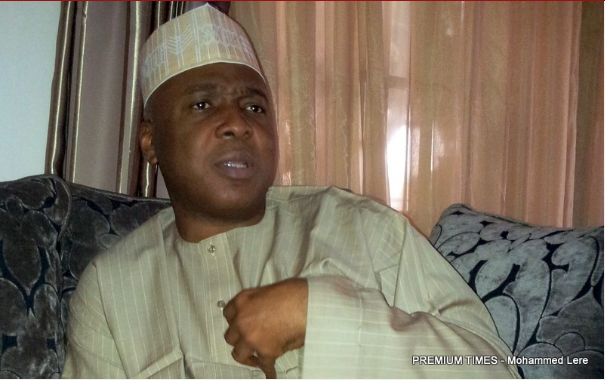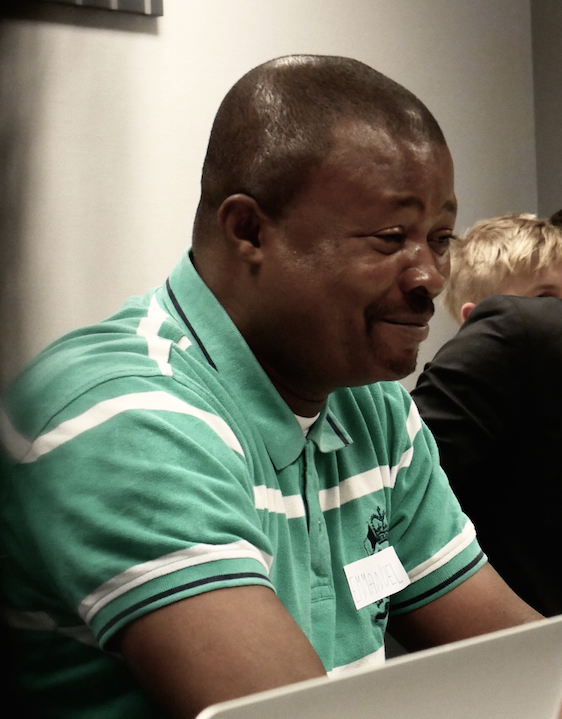
Working on the Panama Papers I have realized, more than ever before, the power of networking and collaboration. The teamwork with international journalists gave me the confidence and empowerment to dare a fearsome figure in the corridor of power.
Written by Emmanuel Mayah* (photograph on the right)
 He came to court with 106 lawyers behind him just to say two words – not guilty. Few politicians in the world have faced more corruption accusations and trials than Bukola Saraki, Nigeria’s Senate President. Beginning with his 8-year rule as governor of Kwara State to his cloak-and –dagger emergence as Senate President in 2015, Saraki has had to defend himself from accusations of $13 million and $100 million money laundry to diversion of $12 million Paris Club Refund and from document forgery to a $260 million Intercontinental Bank loan scam written off as a bad debt without losing assets used as collateral. With 80 Senior Advocates (the equivalent of Queen Counsels) in his payroll, the Senate President had a legal fortress and an army of protectors. What he never saw coming was the Panama Papers, changing the course of his legal battles.
He came to court with 106 lawyers behind him just to say two words – not guilty. Few politicians in the world have faced more corruption accusations and trials than Bukola Saraki, Nigeria’s Senate President. Beginning with his 8-year rule as governor of Kwara State to his cloak-and –dagger emergence as Senate President in 2015, Saraki has had to defend himself from accusations of $13 million and $100 million money laundry to diversion of $12 million Paris Club Refund and from document forgery to a $260 million Intercontinental Bank loan scam written off as a bad debt without losing assets used as collateral. With 80 Senior Advocates (the equivalent of Queen Counsels) in his payroll, the Senate President had a legal fortress and an army of protectors. What he never saw coming was the Panama Papers, changing the course of his legal battles.
Saraki’s hidden assets in tax havens
Saraki was before the Code of Conduct Tribunal (CCT) facing a 13-count charge of false declaration of assets. Besides allegedly making false declarations of his assets, the Senate president was also accused of acquiring assets beyond his legitimate earnings, and operating foreign accounts while serving as a public officer – constitutional violations in Nigeria. The Senate president denied wrongdoings, saying he was facing political persecution for emerging the president of the Nigerian Senate against the wishes of his political party.
Eight months into the trial, which was based only on undeclared assets in Nigeria, I published a story revealing Saraki’s hidden assets in tax havens. Under the code of conduct, a public office holder is required to declare his own assets, those of his wife as well as assets in the names of his children below the age of 18. My story revealed four hidden assets in London, Seychelles and the British Virgin Islands; all in the name of Toyin Saraki, wife of the Senate President.
Challenges I encountered
The biggest challenge I encountered in the course of producing my story were legal threats from two London-based law firms, Discreet Law and Harbottle & Lewis; the first firm representing Saraki, the second his wife. In their separate letters, the Sarakis threatened to sue, should I and the International Consortium of Investigative Journalists (ICIJ) proceed to publish information about the undeclared offshore assets, with Mrs. Saraki saying any publication of her private financial information infringes on her privacy.
Threats from the powerful Saraki family could mean a hard time for any journalist in Nigeria. A high court in Saraki’s home state of Kwara this year ruled that the publisher of Sahara Reporters pay $13 million to the politician as damages over a series of publications deemed libelous. The Sarakis, a political dynasty, still wields enormous influence in Kwara since the ‘70s when Olusola Saraki, father of the current Senate President, was himself Senate Leader. When Bukola Saraki reported at the Special Fraud Unit (SFU) Ikoyi, to answer questions related to the $260 million loan scam, policemen rounded up journalists, locking them up in a room until the politician departed.
Networking and collaboration
I have not experienced any reprisals so far, possibly because the CCT acquitted Saraki in a ruling that outraged the general public and the Amnesty International. However, with an appeal court only last week (early December, 2017) upturning the judgment of the tribunal and sending the Senate President back to court for re-trial, it is widely believed that this time federal prosecutors will strengthen their case using evidence provided by my Panama Paper report.
Working on the Panama Papers I have realized, more than ever before, the power of networking and collaboration. The teamwork with international journalists gave me the confidence and empowerment to dare a fearsome figure in the corridor of power.
* This article was written by Emmanuel Mayah (upper-right photograph) and is part of a project "It happens overnight" funded by Fritt Ord.

